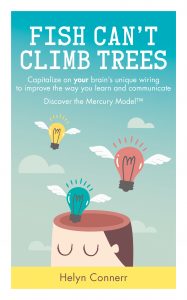The Mercury Model’s gift to Personal Development
Helyn Connerr explains the successful communication and effective learning of The Mercury Model. Far from categorising our personal defects, deficiencies and shortcomings, miles away from telling us what is broken within us and needs to be fixed, The Mercury Model simply shines a clear light on our individual mental dynamics, describing how our minds work naturally and pinpointing our genuine mental strengths. Personal development may start with becoming aware of whatever prevents our seeing or valuing what’s strong, good and positive within us.
The Mercury Model helps close the gap between our authenticity and our opinions about ourselves. It clarifies, on the level of mind, who we are vs. who we think we are or who we think we should be, or who we want to be. Being centred solidly around ourselves allows for maximum strength, for full-power thinking along our personal lines. It removes an unnecessary struggle. We each do best what comes naturally. By providing clear information about how our minds tick, The Mercury Model gives us permission to be our empowered selves, and to stay connected to our best.
So, why on earth is this news to us? We don’t self-assess our minds. We don’t pay attention to our own process of handling information nor that it might be different from other people’s. There is a common misconception that all minds function in the same way. Possibly, we were never approached along the lines of our own natural learning requirements; learning may have always been a struggle, never easy or joyful. For any of a number of reasons, we may have become separated from the best features of our minds, adopting someone else’s style instead.
Let me expound: There are many components of ourselves that we routinely evaluate: if we have dressed appropriately for an event, if we are sufficiently fulfilled and happy in life, if we are healthy and so on. But do we ever consult ourselves about our mental dynamics, what they are and how they work? I expect not. People do not really self-assess their minds, except possibly to wonder if or demonstrate that they are ‘smart’.

Sponge, The Sensitive
We have not been brought up to ask these questions, and most people truly believe that a mind, is a mind, is a mind and they all work in pretty much the same way – like a piece of machinery. But, ignoring the mind’s individuality leads us to devalue our own mental strengths, and cast judgement on everyone else. For example, the Mercury Model learning style called Sherlock, The Detective is extremely sensitive, generally responding to subtlety that is missed by the rest of us. A Sherlock person who is unaware that his mental qualities are specific to himself, could disregard his own extraordinary insightfulness and exceptional problem solving abilities, and conclude that others are, at best, lacking in powers of observation and, at worst, just plain stupid.
We each have our own set of learning requirements and we take in information most easily when it is presented in a way that is compatible with these personal needs. Otherwise we struggle to get it. A presentation which enables one person to easily understand new material can totally befuddle another. If we know what we need, we can ask for it. Here are some examples of improving learning by paying attention to our particular learning needs: If you are ProCon, The Diplomat and you accept your uptake of information is facilitated by discussion, you can chose to phone a friend. If you are Flash, The Pioneer and come to realise that your brain shuts down when your body is stationary, you can go for a walk or a bike ride while thinking through an issue or while memorising your lines for the play. If you are Steady, The Vault and acknowledge that you have always taken in only ideas that you value, you can more easily forgive your total lack of interest in trivia. Some of us do our best mental work out in nature and others in a small room with the door closed. Some of us lose mental power by sharing a fledgling idea too soon; others are empowered by discussion at any stage.

Exec, The Achiever
The Mercury Model accurately and clearly spells out what aids and what inhibits an individual’s ability to take in information.
Our learning requirements might involve:
• The learning environment: including noise, temperature, familiarity, safety or colour.
• The nature of the information itself: like traditional/innovative, significant or abstract.
• The delivery: for instance repetition, fun, fast/slow pace, visuals or interaction.
It can be surprising to discover what assists and what inhibits the learning process in ourselves and others.
We can be duped, at any stage of life, into disconnecting from our own natural way of processing information. Children and adolescents are particularly vulnerable to this. If a parent, relative, teacher or other adult is either very demanding that things are done their way, or powerfully inspirational, a young person can adopt the elder’s mode in order to please, to improve or to survive.
Or if your particular mental strengths are not valued in your community, workplace, school or home, or worse still if they are viewed as weaknesses rather than strengths, the stage is set for you to abandon your best qualities. Adopting another’s style diminishes our mental power and robs the larger group of our authentic contribution.
No particular learning style is either better or worse than another. Each has its own unique contribution to make, all are valuable, and the world needs each one in order to spin properly.
If you want to know more about The Mercury Model, you can read Fish Can’t Climb Trees by Helyn Connerr, available from Watkins Publishing.
Previously published on Watkins Publishing on 11 August 2016

Helyn Connerr
Fish Can’t Climb Trees
£9.99, available from Watkins Publishing






